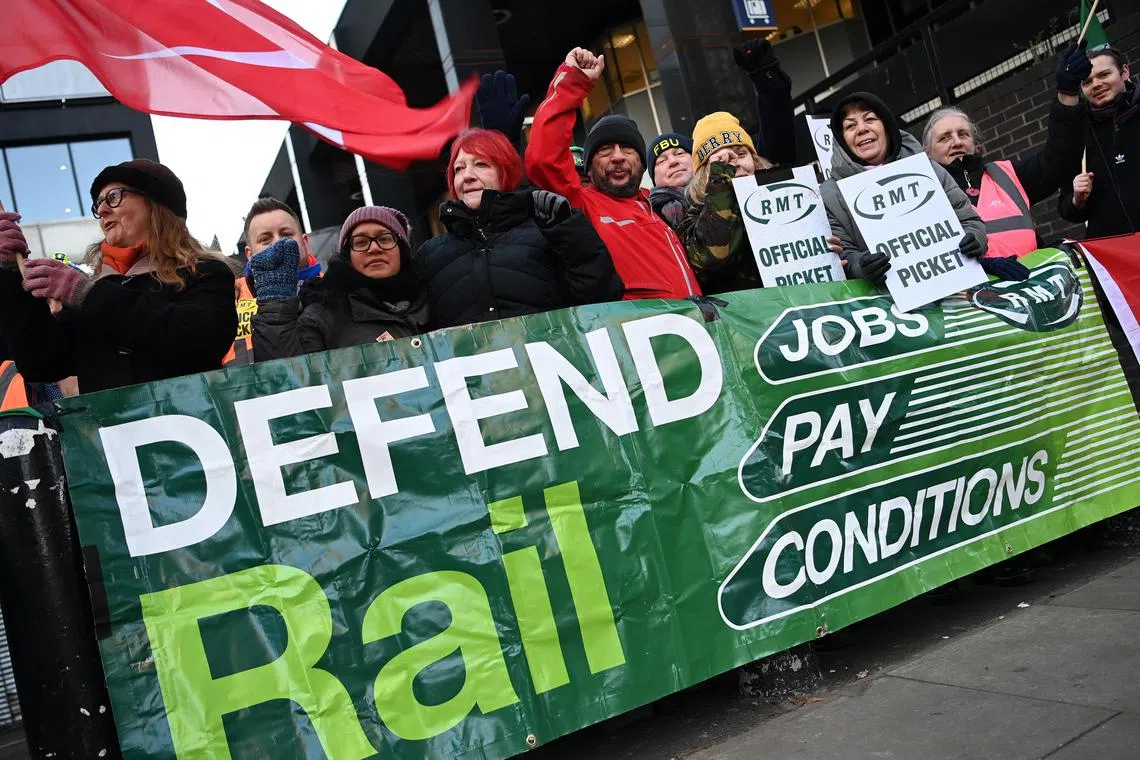Britain suffers most days lost to strikes since Thatcher
Sign up now: Get ST's newsletters delivered to your inbox

Unions staged walkouts across much of the UK’s train network on Tuesday and Wednesday.
PHOTO: EPA-EFE
LONDON - Britain is enduring the highest number of strikes since Mrs Margaret Thatcher was prime minister, according to estimates by a group of economists.
Rail workers, nurses, ambulance drivers, postal delivery staff, bus drivers and civil servants are among those protesting for higher pay to offset the cost-of-living crisis. At the latest reading, UK inflation was 10.7 per cent.
While most of the disputes have been dragging on for months, unions have planned a particularly intense round of walkouts in the run-up to Christmas. Around 1.5 million working days will be lost to strikes in December, Capital Economics said, the highest monthly figure since July 1989.
More than half the working hours lost will come from Royal Mail staff, the estimates showed, with rail strikes the second most prolific.
The Office for National Statistics recently said 417,000 days were lost in October, the most since 2011.
However, the numbers are still considerably smaller than in the 1970s and early 1980s when peaks were often recorded of several million days lost. When Mrs Thatcher came to power in 1979, she inherited a stagnant economy, surging inflation and waves of industrial unrest that she crushed in the following years, bringing in the free-market policies that defined her legacy and endure today.
The country’s gross domestic product could take a 0.5 per cent knock from the latest strikes, Capital Economics said. But its UK economist Ashley Webb said the strikes were likely to have less of an effect due to activity simply being delayed or displaced to other areas. “While the strikes feel widespread, the direct effect on the economy will be small.”
Still, British retailers have been hit by a sharp drop in customers during the peak period for Christmas sales, as shoppers stayed at home amid widespread rail strikes.
Unions staged walkouts across much of Britain’s train network on Tuesday and Wednesday, with another 48-hour protest beginning on Friday. They are demanding higher pay and resisting changes to working practices.
Footfall at retail destinations fell 7.5 per cent this week, according to data provider Springboard. In previous years, the equivalent weeks saw footfall rise by an average of 8.5 per cent as Britons rushed to buy last-minute gifts.
Shops in town and city centres have been worst affected, down 14 per cent due to fewer people travelling in by train.
Retail parks were up, by 0.3 per cent, as people chose to drive instead of taking public transport. Shopping centres, which provide some respite from the freezing weather, were also less affected, down just 1.5 per cent.
Central London suffered by far the sharpest drop in shoppers as swathes of the capital’s office staff worked from home. Footfall was down 25 per cent, and close to 30 per cent lower in areas specifically close to London’s offices.
Retailers have also been affected by the Royal Mail strike, which means some presents will not be delivered in time for Christmas.
However, thousands of workers at luxury carmaker Rolls-Royce – a unit of Germany’s BMW – have much to celebrate this holiday season after they agreed to a pay deal worth up to 17.6 per cent, trade union Unite said on Friday, calling it the largest single pay deal in the history of the factory in southern England.
The deal comprised a 10 per cent pay increase and a one-off payment of £2,000 (S$3,312) and will apply to 1,200 workers, Unite said. The package is one of the highest deals agreed by a workforce in Britain in recent months.
Others in the auto sector across Europe are also dealing with increased wage demands.
BLOOMBERG, REUTERS


